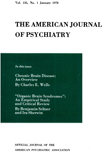Changes in Public Attitudes on Narcotic Addiction
Abstract
By sampling articles on narcotic addiction from the popular magazines over the past seven decades, the authors investigated trends in public attitudes toward the narcotic addict. In comparison with the public view in 1900, the addict is now seen as less responsible for his behavior, and the social milieu is given greater significance. Public recommendations about coping with the problem of addiction have shifted in emphasis from punitive methods to medical treatment and social rehabilitation. These findings are consistent with concurrent changes in the popular view of the nature of man.
Access content
To read the fulltext, please use one of the options below to sign in or purchase access.- Personal login
- Institutional Login
- Sign in via OpenAthens
- Register for access
-
Please login/register if you wish to pair your device and check access availability.
Not a subscriber?
PsychiatryOnline subscription options offer access to the DSM-5 library, books, journals, CME, and patient resources. This all-in-one virtual library provides psychiatrists and mental health professionals with key resources for diagnosis, treatment, research, and professional development.
Need more help? PsychiatryOnline Customer Service may be reached by emailing [email protected] or by calling 800-368-5777 (in the U.S.) or 703-907-7322 (outside the U.S.).



